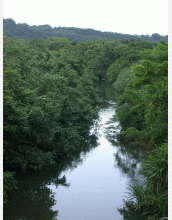|

Press Release 05-189
NSF Awards 17 Grants for Research on Biocomplexity in the Environment

Connections among living things from Genes To Ecosystems Studied
October 31, 2005
To better understand the interrelationships among living things--from their genes to the ecosystems they inhabit and how they interact with their environment--the National Science Foundation (NSF) has awarded 17 grants to scientists and engineers across the country to study biocomplexity in the environment.
Ten awards were made in 2005 from the Biocomplexity in the Environment (BE) program, now in its sixth year, for studies of the dynamics of coupled natural and human systems (CNH), and seven for research on "materials use: science, engineering, and society (MUSES)". CNH grantees were awarded a total of just over $10 million; MUSES grantees were awarded almost $7 million.
"These investigations will provide a more complete understanding of natural processes and cycles, of human behavior and decisions in the natural world, and of ways to use new technology effectively to observe the environment," said Margaret Leinen, NSF assistant director for geosciences, and coordinator of NSF’s Environmental Research and Education (ERE) programs.
Research on BE, said Leinen, will shed light on connections that are not necessarily straightforward or easily discerned, but that are critically important to the future of life on our planet.
"Scientists and engineers need to work in teams across diverse fields that go beyond biology to include physics, engineering, economics, geochemistry and others, on studies that extend from the molecular level to changes in the world's climate," said Leinen. "We now have the technologies and tools to make this kind of research possible."
Organisms from microbes to humans make up the BE framework, as do environments that range from frozen polar regions to deep-ocean hydrothermal vents, from temperate forests to agricultural lands to the neighborhoods and industries of urban centers.
Research projects in the CNH sub-category include studies of urban landscape patterns, human vulnerability and resilience to subarctic change, understanding linkages among human and biogeochemical processes in agricultural landscapes, and long-term coupled socioecological change in the American southwest and northern Mexico.
MUSES investigators will conduct research on improving and valuing materials flow of the metal-casting industry, engineering environmentally benign electronics, implications of automotive fuel economy and emissions policies on materials flows, and renewable energy from forest resources.
-NSF-

Media Contacts
Cheryl Dybas, NSF (703) 292-7734 cdybas@nsf.gov
Related Websites
BE '05 awards: http://www.nsf.gov/geo/ere/ereweb/fund-biocomplex.cfm

The National Science Foundation (NSF) is an independent federal agency that supports fundamental research and education across all fields of science and engineering. In fiscal year (FY) 2009, its budget is $9.5 billion, which includes $3.0 billion provided through the American Recovery and Reinvestment Act. NSF funds reach all 50 states through grants to over 1,900 universities and institutions. Each year, NSF receives about 44,400 competitive requests for funding, and makes over 11,500 new funding awards. NSF also awards over $400 million in professional and service contracts yearly.
 Get News Updates by Email Get News Updates by Email
Useful NSF Web Sites:
NSF Home Page: http://www.nsf.gov
NSF News: http://www.nsf.gov/news/
For the News Media: http://www.nsf.gov/news/newsroom.jsp
Science and Engineering Statistics: http://www.nsf.gov/statistics/
Awards Searches: http://www.nsf.gov/awardsearch/
| 

